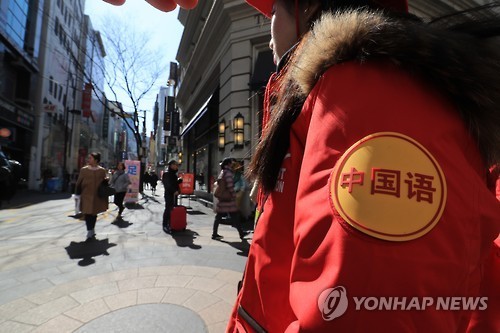South Korea's tourism sector and consumer goods makers are bearing the brunt of China's retaliation for Seoul's deployment of an advanced US missile defense system, analysts said Wednesday, urging efforts to brace for tougher and prolonged retaliatory steps down the road.
Last week, China ordered travel agencies to stop selling group tours to South Korea after Seoul finalized a deal with Lotte Group to station a Terminal High Altitude Area Defense battery on a Lotte golf course in the southeastern county of Seongju.

The deal came seven months after Seoul and Washington agreed to install the anti-missile battery to better counter missile threats from North Korea. China has slammed the deployment of the system, which comes with a high-powered radar, insisting America will use the device to spy on its military.
According to industry watchers, South Korean travel agencies, duty-free shops and hotels are likely to be hit hardest by Beijing's travel restrictions, which have forced more than 100,000 Chinese to cancel trips to Seoul.
Last year, the number of foreign visitors to South Korea came to 17.2 million, nearly 49 percent of which were Chinese tourists.
According to a report by the LG Economic Research Institute, Chinese visitors spent 15.7 trillion won ($13.7 billion) in South Korea in 2015, accounting for 62.5 percent of all foreign tourism expenditures here and amounting to some 0.5 percent of South Korea's gross domestic product.
China's ban on trips to South Korea is feared to sharply lower the number of tourists from the neighboring country.
"The number of Chinese visitors to South Korea is expected to drop 20 percent on-year in the second quarter and 7 percent for all of 2017," said Yang Il-woo, a researcher at Samsung Securities Co.
"However, there is a possibility of the number of Chinese tourists plunging up to 70 percent, depending on the situation."
China's travel restrictions are also expected to batter local duty-free shops that are highly dependent on Chinese customers for their sales.
Last year, the combined top line of South Korean duty-free shops reached 12.3 trillion won, some 70 percent of which was estimated to have come from Chinese tourists.
In addition, Lotte Mart, a discount store arm of Lotte Group, has suffered harsh retaliation, with South Korean cosmetics manufacturers, which are highly popular among Chinese consumers, feared to be hurt as well.
As of late Tuesday, 39 Lotte Mart stores in China were put under business suspension for at least a month due to a breach of fire regulations. Lotte Mart currently runs 99 outlets in the world's second-largest economy.
Industry watchers, however, point out that China is unlikely to impose sanctions on South Korean makers of raw materials, intermediate goods and industrial parts, which are necessary for its exports.
"Basically, China imports raw materials and capital goods from South Korea and exports finished goods to advanced countries after processing and assembling them," said Ahn Ki-tae, an analyst at NH Investment & Securities Co. "South Korean exporters of such products are unlikely to be hit hard as China may find it difficult to look for alternative import sources."
Market watchers, meanwhile, said the start of the THAAD deployment in South Korea could worsen China's public opinion, raising the possibility that the scope of Beijing's retaliation may expand and last a long time.
"If the 2012 conflict between Tokyo and Beijing over the Senkaku Islands is any indication, South Korea should prepare for a possibility that China may step up its retaliation until June, when the THAAD deployment is expected to go into full swing," said Lee Kyung-min, a researcher at Daishin Securities Co.
In an unexpected move, the first elements of the system, including two launchers, arrived at Osan Air Base in Pyeongtaek, 70 kilometers south of Seoul, Monday. A Seoul military official said that the deployment could be completed within one or two months and it can be operational as early as April.
The row over THAAD comes amid growing trade between Seoul and Beijing. China is South Korea's largest trade partner. Last year, South Korea's exports to the world's second-largest economy reached $124.43 billion, with its imports coming to $86.98 billion. (Yonhap)











![[Hello India] Hyundai Motor vows to boost 'clean mobility' in India](http://res.heraldm.com/phpwas/restmb_idxmake.php?idx=644&simg=/content/image/2024/04/25/20240425050672_0.jpg&u=)







